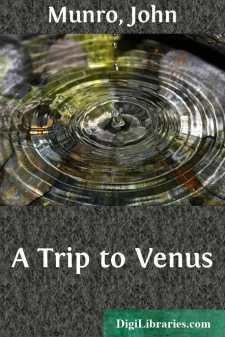Categories
- Antiques & Collectibles 13
- Architecture 36
- Art 48
- Bibles 22
- Biography & Autobiography 813
- Body, Mind & Spirit 138
- Business & Economics 28
- Children's Books 12
- Children's Fiction 9
- Computers 4
- Cooking 94
- Crafts & Hobbies 4
- Drama 346
- Education 46
- Family & Relationships 57
- Fiction 11821
- Games 19
- Gardening 17
- Health & Fitness 34
- History 1377
- House & Home 1
- Humor 147
- Juvenile Fiction 1873
- Juvenile Nonfiction 202
- Language Arts & Disciplines 88
- Law 16
- Literary Collections 686
- Literary Criticism 179
- Mathematics 13
- Medical 41
- Music 40
- Nature 179
- Non-Classifiable 1768
- Performing Arts 7
- Periodicals 1453
- Philosophy 64
- Photography 2
- Poetry 896
- Political Science 203
- Psychology 42
- Reference 154
- Religion 505
- Science 126
- Self-Help 81
- Social Science 81
- Sports & Recreation 34
- Study Aids 3
- Technology & Engineering 59
- Transportation 23
- Travel 463
- True Crime 29
A Trip to Venus
by: John Munro
Categories:
Description:
Excerpt
CHAPTER I.
A MESSAGE FROM MARS.
While I was glancing at the Times newspaper in a morning train for London my eyes fell on the following item:—
A STRANGE LIGHT ON MARS.—On Monday afternoon, Dr. Krueger, who is in charge of the central bureau at Kiel, telegraphed to his correspondents:—
"Projection lumineuse dans région australe du terminateur de Mars observée par Javelle 28 courant, 16 heures.—Perrotin."
In plain English, at 4 a.m., a ray of light had been observed on the disc of the planet Mars in or near the "terminator"; that is to say, the zone of twilight separating day from night. The news was doubly interesting to me, because a singular dream of "Sunrise in the Moon" had quickened my imagination as to the wonders of the universe beyond our little globe, and because of a never-to-be-forgotten experience of mine with an aged astronomer several years ago.
This extraordinary man, living the life of a recluse in his own observatory, which was situated in a lonely part of the country, had, or at any rate, believed that he had, opened up a communication with the inhabitants of Mars, by means of powerful electric lights, flashing in the manner of a signal-lantern or heliograph. I had set him down as a monomaniac; but who knows? perhaps he was not so crazy after all.
When evening came I turned to the books, and gathered a great deal about the fiery planet, including the fact that a stout man, a Daniel Lambert, could jump his own height there with the greatest ease. Very likely; but I was seeking information on the strange light, and as I could not find any I resolved to walk over and consult my old friend, Professor Gazen, the well-known astronomer, who had made his mark by a series of splendid researches with the spectroscope into the constitution of the sun and other celestial bodies.
It was a fine clear night. The sky was cloudless and of a deep dark blue, which revealed the highest heavens and the silvery lustre of the Milky Way. The great belt of Orion shone conspicuously in the east, and Sirius blazed a living gem more to the south. I looked for Mars, and soon found him farther to the north, a large red star, amongst the white of the encircling constellations.
Professor Gazen was quite alone in his observatory when I arrived, and busily engaged in writing or computing at his desk.
"I hope I'm not disturbing you," said I, as we shook hands; "I know that you astronomers must work when the fine night cometh."
"Don't mention it," he replied cordially; "I'm observing one of the nebulas just now, but it won't be in sight for a long time yet."
"What about this mysterious light on Mars. Have you seen anything of it?"
Gazen laughed.
"I have not," said he, "though I did look the other night."
"You believe that something of the kind has been seen?"
"Oh, certainly. The Nice Observatory, of which Monsieur Perrotin is director, has one of the finest telescopes in existence, and Monsieur Javelle is well-known for his careful work."
"How do you account for it?"
"The light is not outside the disc," responded Gazen, "else I should ascribe it to a small comet....


